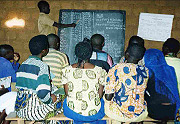Managing a small-scale but comfortably paying business, Ildefonce Nizeyimana beams with gratitude as he reminisces how far the initiative against illiteracy has brought him. Having accumulated a reasonable amount of profits out of his local brew business, just like any other forward looking young entrepreneur, Nizeyimana desired to open a bank account.


Managing a small-scale but comfortably paying business, Ildefonce Nizeyimana beams with gratitude as he reminisces how far the initiative against illiteracy has brought him.
Having accumulated a reasonable amount of profits out of his local brew business, just like any other forward looking young entrepreneur, Nizeyimana desired to open a bank account. However, having not gone to school and being completely illiterate, he was afraid.
He could not go to near-by Bank Populaire branch to open an account mostly because he didn’t want his newly acquired girlfriend working at the bank to realise that he could not read and fill in the forms at the bank yet he had given her the impression that he was literate.
Subsequently, Nizeyimana requested a friend to open an account on his behalf. As fate would have it, this friend turned out to be crafty and instead opened the account in his own names.
When Nizeyimana felt the time was ripe to venture into a bigger and smarter business, he asked his friend to help him withdraw some money only for the latter who had robbed him telling him that he couldn’t do that (withdraw) and that he didn’t owe him any money. This is just one of the many absurd circumstances illiterate people have endured in Rwanda and the world-over.
The above is one of the stories from some of the beneficiaries of Fight Illiteracy Youth Organisations (FIYO), a local NGO devoted to fighting illiteracy most especially among the unfortunate vulnerable groups of people like orphans and others who didn’t get a chance to undergo formal education and those whose literacy skills diminished when they dropped out of school.
Though it is widely acknowledged that illiteracy and ignorance are some of the overriding causes of poverty in developing countries, there is a lot to be desired in this sector.
Given the undesirable political and administrative styles that characterised the previous governments, the biggest segment of the population was left illiterate and potentially domesticated by its effects.
Among the heartening status quo’s left behind by these governments was the overwhelming number of orphans without educational support, some of these with other groups of vulnerable youth’s and adults have remained illiterate up to date.
Having experienced this phenomenon through his exposure to the diverse communities of Rwanda while working as an advocate for empowerment of the girl child through education, Moses Gahigi (not the writer) was inspired to start up a literacy promotion agency.
Though it started as an NGO targeting the youth who had never had a chance to education and those who dropped out, which aspect is even portrayed in its brand name of Fight Illiteracy Youth Organisation (FIYO), it has spread its nets to incorporate adults.
During an interview with Gahigi, the founder and Executive Director of FIYO-Rwanda, he revealed that the adults were integrated due to what they discovered as an overwhelming need for literacy among the adults which was expressed by many in the communities.
Operating in the Districts of Gastibo and Nyagatare FIYO has trained over 5000 people both young and old in literacy skill, in a period of six years since its inception in 2003.
On asking how the agency has managed to counterbalance both the youth and adults in learning, yet these two have incompatible learning needs and environment, Gahigi revealed that the strategy they first employed was training facilitators on how to handle both groups of learners.
"We first train facilitators on how to handle adults in the learning situation. For instance how to design a learning environment favourable for adults. Also, since they also have differing learning needs from the young we modify the curriculum to suit them,” said Gahigi.
FIYO is currently using 60 centres spread in the two districts it operates, though is envisaging opening up other centres in other districts of the country, given more funding.
The literacy skills provided by FIYO have already started impacting the lives of the beneficiaries in a multi-disciplinary sense.
Anonciatta Karikumutima had never dreamt of working in an administrative position.
However, after acquiring literacy skills from a six months course at the centre after which she was given a certificate she assumed a local administrative position.
Beneficiaries of the literacy trainings through Functional Adult Literacy, a tool that FIYO employs to impact people’s economic and social lives through literacy provision, have added value to their businesses, improved agricultural production through a partnership with Umutara Community Resources and Infrastructural Development Program.
Being illiterate not only robs one a chance of interacting and functioning in the world of information sharing, but also cripples a person’s creativity and zeal for work, since that person often times feels inadequate and lacks confidence to front his or her actions and ideas.
Promoting literacy skills among people who have this deficiency will help to put the entire population on the same footing, through empowering them to participate in development to collectively achieve the vision 2020.
And hopefully, scenarios such as the one of Nizeyimana and his not so good friend will be history.
Ends


